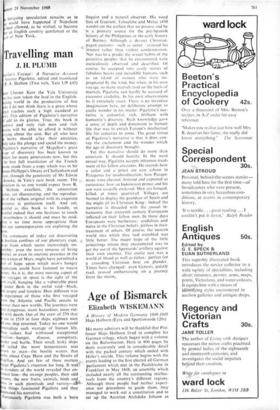Travelling man
J. H. PLUMB
;,flap's Voyage: A Narrative Account Antonio Pigafetta, edited and translated R. A. Skelton (Two vols, Yale UP £45) a Chester Kerr the Yale University , has now taken the lead in the English- .,king world in the production of fine oks. I do not think there is a press whose tput reaches such a high standard as le's. This edition of Pigafetta's narrative I add to its glories. True, the book is pensive and only rich men and rich ratio will be able to afford it without Trying about the cost. But all who love books should aBay their anxieties, Idly take the plunge and spend the money: Pigafetta's narrative of Magellan's great ■ age of discovery has been known to olars for many generations now, but this the first full translation of the French ,ion, made from a copy which was in Sir omas Phillipps's library at Cheltenham and now, through the generosity of Mr Edwin Beineke, in Yale's rare book room. The mlation is, as one would expect from R. Skelton, excellent, the annotation met, yet illuminating, and the reproduc- e of the vellum original with its exquisite matures is perfection itself. And yet, autiful as this book is to handle, so dutiful indeed that one hesitates to touch nevertheless it should and must be read. are is no time more appropriate than n our contemporaries are exploring the on.
1 he astronauts of today are discovering desolate confines of our planetary cage, ape from which seems increasingly im- bable: even the most tenuous of living erial, or even its onetime presence in the y wastes of Mars, might have permitted a din of hope upon which man's hungry agination could have fastened to weave earns. As it is, the most moving aspect of "e voyages in space is the sight of the nh itself, hanging like a vulnerable piece tender flesh in the awful void—black, Id. empty and timeless. How different was experience of those who first voyaged rocs the Atlantic and Pacific oceans to over their new worlds. The journeys were ore dangerous, more hazardous, more rid- e with death. Out of the crew of 270 that t out in 1519 in four ships, eighteen men d one ship returned. Today no one would
ntemplate such wastage of human life.
ese sailors had withstood exceptional ivation--hunger, disease, conspiracy,
order and battle. Their small, leaky ships d sailed the most tempestuous seas own to man—the hostile waters that ethe about Cape Horn and the Straits of agellan. And yet few of these matters,.... gage Pigafetta's attention for long. It wash e wonders of the world revealed that en- ',laced him—the strange peoples, their odd stoms, the new fruits, animals, birds and es in such plentitude and variety—ail , se things fascinated Pigafetta and they lominated his narrative.
Fortunately Pigafetta was both a born
linguist and a natural observer. His word lists of Guarani, Tehuelche and Malay (450 words) are the earliest that we possess and he is a primary source for the pre-Spanish history of the Philippines or the early history of Borneo. Although a devout Christian, pagan customs—such as suttee- -aroused his interest rather than violent condemnation. Nor was he a prude; the sexual habits of the primitive peoples that he encountered were meticulously observed and described. Of course, he accepted very easily stories of fabulous beasts and incredible humans, such as an island of women who were im- pregnated by the wind, but when, in his own voyage, so many marvels trod on the heels of marvels, Pigafetta can hardly be accused of excessive credulity. In his own observations he is extremely exact. There is no inventive imagination here, no deliberate attempt to excite wonder in his reader. Pigafetta's nar- rative is colourful, rich, brilliant with humanity's diversity. Such knowledge gave a sense of depth and dimension to human life that was to enrich Europe's intellectual life for centuries to come. The great virtue of Pigafetta's narrative is that it does con- vey the excitement and the wonder which the age of discovery brought.
Yet this narrative should do more than entertain. It should horrify. in the most casual way, Pigafetta accepts inhuman treat- ment of his fellow creatures. He records how a sailor and a priest are cast ashore in Patagonia for insubordination; how Patago-
.,,,, nians were cheated, fettered and captured as curiosities; how an Indonesian prince and his son were casually enslaved. Men are hanged, killed, at times quartered. Villages are burned to display the grandeur of Spain and the might of its Christian King: indeed the narrative is threaded with the casual in- humanity that sixteenth century Europeans inflicted on their fellow men. In those days Europeans were barbarous: credulous and naïve in the Christian beliefs, pitiless in their treatment of others. Of course, the eastern world into which they had stumbled was
* little better. The major hope of the little - princelings whom they encountered was to get the use of the Spaniards' artillery against their own enemies. The exotic east was a world of blood as well as riches: perfect for a crusading Christian bent on plunder. Times have changed: even Genesis, quietly read, proved embarrassing on a journey from the moon,










































 Previous page
Previous page